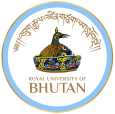Submission Guidelines
Eligibility Criteria
Only abstracts and papers that are directly relevant to Bhutan will be accepted for this conference. Submissions should clearly demonstrate a focus on Bhutan’s context—be it in terms of data, case studies, policy implications, cultural significance, or development priorities. Papers lacking a meaningful connection to Bhutan may not be considered for review.
Guidelines for Submission of Papers
General Instructions:
- Text font size: 12
- Font type: Arial
- Reference style: APA 7th
Stage 1: Abstract
We invite abstracts (400–500 words) of recently completed research work or papers in advanced stages aligned with the main theme or sub-themes. Submissions should include:
- Title of the paper
- Author(s) name, affiliation, and contact details (limit the author numbers to 3-5 authors)
- 5–6 keywords
- Brief bio of the author(s) (100–150 words)
The abstracts submitted shall go through double-blind peer-review process by a Technical Committee formed to assess the relevance of the abstracts to the Conference theme and sub-themes.
Deadline for the Submission of Abstracts: 31st July 2025
Review & Acceptance of Abstracts: 6th August 2025
Stage 2: Full Paper
The full papers shall undergo double-blind peer-review process for relevance, quality and standards, in terms of depth of research knowledge, appropriateness of research methods, data collection tools, data analysis, and research findings by the Technical Committee for the final selection. The following dates will be the timeline followed for the submission of Abstracts and Final papers:
Deadline for submission of Full Papers: 1st October 2025
Review and Acceptance of Final Papers: 10th October 2025
Note: Selected papers will be published in a special issue of the Bhutan Journal of Research and Development (BJRD) of the Royal University of Bhutan.
Who Should Attend?
- Academics, researchers, curriculum developers across disciplines
- Education leaders and practitioners
- Policy makers and development practitioners
- Students and early-career scholars
- Business leaders and professionals/researchers from think tanks, NGOs, and innovation hubs
- Members of the Bhutanese diaspora and Australia–Bhutan research collaborators
- Any other international scholars with research on Bhutan
Why Bhutan? Why Now?
Bhutan stands at a pivotal moment, offering the world a developmental alternative rooted in values of wellbeing, sustainability, and spiritual integrity. The emergence of the Gelephu Mindfulness City as a model for humane urbanism, coupled with Bhutan’s emphasis on GNH, makes this Conference a timely and meaningful platform for dialogue and discovery.
Contact and Further Information
For inquiries, submissions, or partnership interests, please contact:
Email: abrc2025@rub.edu.bt
